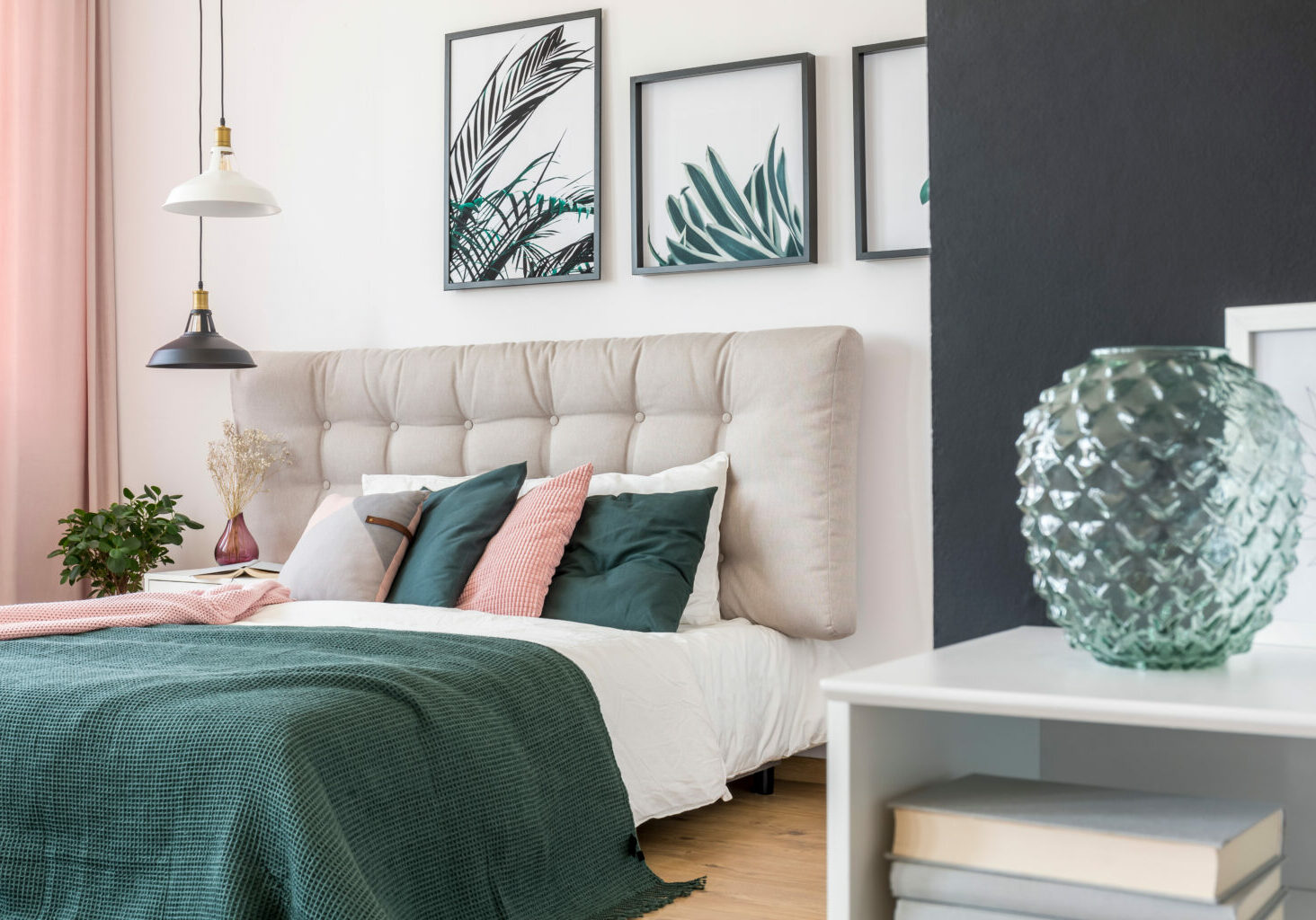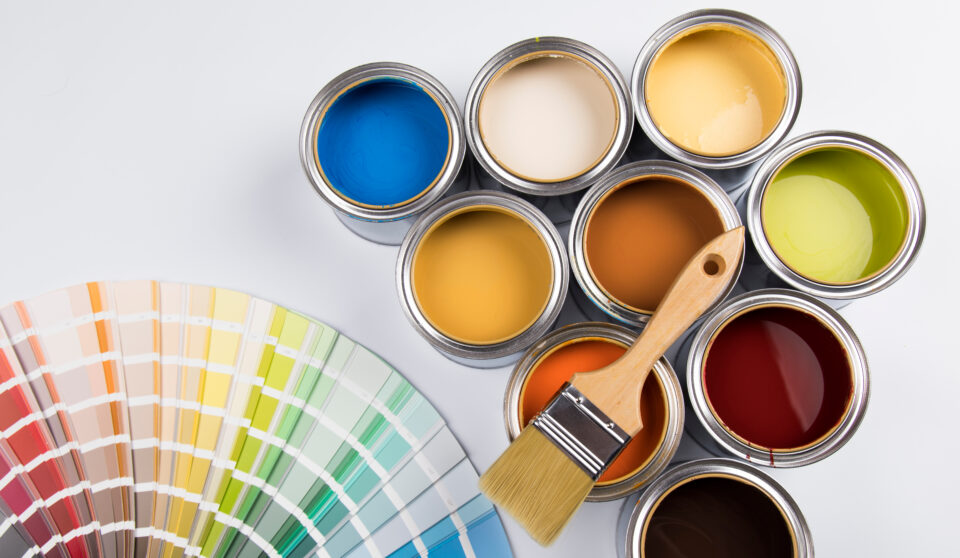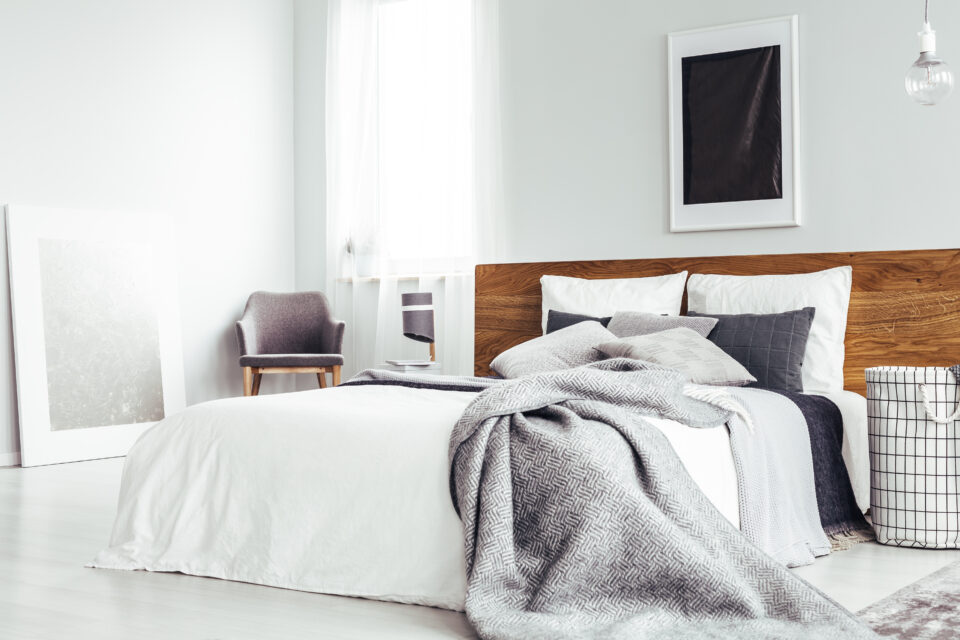Can You Sleep in a Room After Painting It? A Comprehensive Guide

January 19, 2023
By Fresh Coat
Tags
Tips
We all want the most comfortable living space possible. One of the easiest home improvement projects is to add a fresh coat of paint to an older room. It’s insanely easy to do and can make a massive difference in the look and feel of your home.
While a newly painted room is a wonderful home improvement, it’s important to be aware of the impact of paint fumes, particularly right after the paint has dried. It can take some time for the smell and fumes to leave the space, and this can have an impact on your health.
So, is it safe to sleep in a freshly painted room? Keep reading to learn more about the effects of paint fumes and how to keep your family safe after a paint job has been completed.

The Effects of Breathing in Paint Fumes
The effect of paint fumes while sleeping can be a cause for concern. The impact of breathing paint fumes while sleeping is the same as when you’re awake.
Paint fumes can negatively impact your health due to Volatile Organic Compounds (VOCs).
The time it takes for VOCs to dissipate depends on several factors, including the humidity and the type of paint you’re using. For example, oil-based paints take far longer than latex-based paints to dissipate.
With 81% of homeowners taking on a DIY job in 2021, it has never been more important for homeowners to familiarize themselves with the adverse health effects of paint fumes.
What are VOCs?
VOCs are compounds with low water solubility and high vapor pressure. Most VOCs encountered originate from human-made chemicals. They’re most commonly found in paint, refrigerants, and pharmaceuticals.
Whenever you paint a room, you will notice a strong chemical smell. The VOCs in the air cause these odors to persist throughout your home.
Efforts have been made to produce paints with lower concentrations of VOCs, but no paint products are available with zero VOCs. They are a natural by-product of paint production.
What are the Effects of Breathing Paint Fumes While Sleeping?
Sleeping in a room with paint fumes can have harmful effects on people of all ages, particularly babies, young children, and pregnant women. The primary effects of inhaling paint fumes include:
- Eye, nose, and throat problems
- Headaches
- Nausea
- Liver damage
- Kidney damage
- Central nervous system damage
- Cancer
While you might be worried about organ and nervous system damage, it’s highly unlikely that you’ll be exposed to enough VOCs when painting your home. Only high levels of exposure can cause these life-altering effects.
Furthermore, cancer caused directly by VOCs has only been observed in animal studies, but researchers believe humans could develop cancer after long-term exposure.

Can You Sleep in a Room After Painting?
While sleeping in a freshly painted room can be hazardous to your health, you can avoid the dangers by taking the proper precautions, including the type of paint used and giving the paint time adequate time to dry.
So, how long should you vacate a freshly painted room? This depends on more than one factor.
Let’s examine which aspects determine how long you should avoid sleeping or spending time in a newly painted room.
Type of Paint Used
Most homeowners will use one of two types of paint: latex or oil.
Latex paints are the most common paint used in residential homes. Homeowners prefer it for its quick drying qualities. However, latex paint needs the right temperature and humidity. If your room is too cold, it will take longer to dry.
The ideal temperature for latex paint is 60 degrees Fahrenheit and below 60% humidity. At this level, latex paint will take one hour to dry and four hours until it’s suitable for another coat.
On the other hand, while less prevalent, oil-based paints are preferred for rooms with high moisture content. The most obvious example would be your bathroom. Oil-based paints take much longer to dry, with an average of eight hours for oil-based paint to dry to the touch. Expect to wait 24 hours before it becomes suitable for recoating.
During this time, you should vacate the room and maintain proper airflow to avoid the damaging effects of VOCs.
Latex paints have fewer VOCs, but if you’re especially worried about the impact of paint fumes, consider low-VOC paint. They still contain VOCs, but they’re far less harmful to vulnerable people in your household.
Humidity
Humidity also greatly impacts how long you’ll need to wait to sleep in a freshly painted room safely. More moisture in the air means waiting longer for your paint to dry.
Extra water droplets in the air will actively prevent your paint from forming a protective film. Depending on where you live and what time of year you’re painting, this could present a problem.
For example, if you live in states like Missouri or Alabama, it’s best to avoid painting during the summer. Alabama records a relative humidity of 71.6% on average, which is more than 10% above the ideal humidity for latex-based paint.
Ventilation
Always maintain enough ventilation throughout a freshly painted room. Appropriate airflow limits VOC concentrations, which is why professional painters often open the windows while they’re painting.
Ventilation doesn’t just eliminate strong chemical odor; it allows moisture to evaporate and oxidation to take place. Solvent-based paints are especially reliant on ventilation to achieve their average drying times.
While it may seem counterproductive, keep the internal doors of the room open to maximize airflow. Depending on the weather, you may also want to open the windows in adjacent rooms to aid the drying process.
Paint Incompatibility
Different paints exist for different surfaces for a reason. Some homeowners make the mistake of applying an incorrect type of paint to a surface.
For example, applying paint designed for enamel to metal will drastically extend drying times. In some scenarios, you may experience a phenomenon known as kumukulong pintura.
One of the consequences of this phenomenon is paint saponification. It’s a chemical reaction that leads to paint failure. In practice, the coating will remain soft and never completely dry. Saponification also leads to VOCs continuing to be emitted.
You’ll likely notice this problem while you’re painting, as it will feel like the paint isn’t quite sitting right on your walls.

How Soon Can You Sleep in a Room After Painting?
If you’re wondering when you can return to your room after it’s been painted, it depends on several components, specifically how long it takes for newly painted walls to dry.
Many factors can influence drying times. However, if you have the ideal conditions, there are ballpark figures you can rely on.
Latex-based paints take approximately one hour to dry before they become dry to the touch. Check on your walls after an hour and make sure there are no remaining wet patches on the walls. After you’re sure everything is dry, keep the windows open for at least another hour to allow any lingering fumes to escape. You should leave the windows open until you can no longer smell any paint.
Can you sleep in a room that was just painted if there’s a mild undercurrent of fumes? You can, but it’s not recommended.
Oil-based paints take around eight hours to become dry to the touch. Repeat the same process as you would with latex-based paint, including opening the windows and allowing the fumes to disperse.
Note that oil-based paint fumes take longer to dissipate. Like latex paints, use the smell test to determine whether it’s safe to sleep in the room.
To make a room 100% safe to sleep in, allow one to two hours of fresh air to flow through the room. Experts also recommend allowing fresh air to continually flow through a freshly painted room for the next two to three days.
Sleeping in a freshly painted room when pregnant or with small children poses a greater health risk, including developmental issues. Even if you can’t smell any fumes, avoid sleeping in a painted room for two to three days.

FAQs
Can you sleep in a freshly painted room if you’re pregnant?
No. Pregnant women risk compromising the development of their unborn children when exposed to paint fumes. While the risk is low, there’s no reason to take it.
Pregnant women should avoid newly painted rooms for at least two to three days. Ideally, pregnant women shouldn’t be exposed to paint fumes in a home at any point. Families who find themselves in this situation should err on the side of caution.
If you’re sleeping in a nearby room temporarily, ventilation is key. Weather permitting, keep the doors and windows open to minimize the risk of paint fume exposure.
What happens if you sleep in a freshly painted room?
Most people exposed to VOCs at home will find themselves experiencing headaches and nausea. Some may also feel some eye, nose, or throat irritation. This irritation might come in the form of burning sensations in the nasal membranes.
Organ damage, such as to the kidneys and lungs, is exceedingly rare. On the other hand, even mild exposure to VOCs emitted from the paint can cause babies, pregnant women, and young children to experience developmental issues. Give your walls adequate time to dry and your room sufficient time to air out to avoid this risk.
How long after painting can I sleep in the room?
To summarize some basic information:
- Latex – Wait for one hour to dry and allow for two hours of fresh airflow.
- Oil – Wait eight hours to dry with two hours of fresh airflow.
In both cases, maintain ventilation for two to three days. More vulnerable people should refrain from sleeping in a room entirely until two to three days have passed.
What if my room has no windows?
Some rooms in your home may not have any windows, such as certain attics or basements. Lack of direct ventilation via windows can cause the paint to take longer to dry and for VOCs to dissipate.
Never sleep in a room without windows if you’ve painted it that day. Windowless rooms can take up to three days for your paint to stop emitting VOCs.
You can accelerate the process by opening doors and windows around your home. Ideally, you should wait up to five days before sleeping in the room.

Trust the Painting Experts
Painting a room requires careful consideration. Too many people start painting projects without factoring in health concerns. Now that you know the impact of paint fumes and how long you should avoid sleeping in a newly painted room, it’s time to get your walls updated the right way.
Opt for house painters that know the importance of a pristine finish. Fresh Coat Painters is the painting company you need if you want to elevate your home and make the most of your next home improvement project.
To learn more about what we can do for you, contact Fresh Coat Painters for your free quote today!